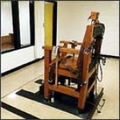An End to Capital Punishment?
From Dick Meister | 02:49
Thanks to two California doctors, we may finally be able to abolish the barbaric practice of capital punishment.
- Playing
- An End to Capital Punishment?
- From
- Dick Meister
 If doctors everywhere would refuse to take part in executions -- as two doctors in California just did -- that could be the end, at last, of capital punishment in the United States. Doctors are needed to verify that particular executions do not violate the constitutional ban on cruel and unusual punishment by causing unnecessary pain.
If doctors everywhere would refuse to take part in executions -- as two doctors in California just did -- that could be the end, at last, of capital punishment in the United States. Doctors are needed to verify that particular executions do not violate the constitutional ban on cruel and unusual punishment by causing unnecessary pain.
Commentary: 21st Century Injustice
From Dick Meister | 03:09
The execution of Stanley Tookie Williams exposed yet again the barbarity of capital punishment.
- Playing
- Commentary: 21st Century Injustice
- From
- Dick Meister
 Stanley Tookie Williams devoted 18 years of his imprisonment on Death Row to trying to help young people escape the violent street gang life he had led. He was credited with saving probably hundreds of lives in this country and others by turning young people away from violent confrontation and persuading thousands to leave or stay out of gangs. But despite his continuing good work, despite his rehabilitation, despite serious doubts about whether he was guilty of the murders that put him on Death Row, Williams was executed by the state of California on Dec. 13. Few cases have more clearly shown what's so terribly wrong with the practice of capital punishment that most other industrial nations have abolished.
Stanley Tookie Williams devoted 18 years of his imprisonment on Death Row to trying to help young people escape the violent street gang life he had led. He was credited with saving probably hundreds of lives in this country and others by turning young people away from violent confrontation and persuading thousands to leave or stay out of gangs. But despite his continuing good work, despite his rehabilitation, despite serious doubts about whether he was guilty of the murders that put him on Death Row, Williams was executed by the state of California on Dec. 13. Few cases have more clearly shown what's so terribly wrong with the practice of capital punishment that most other industrial nations have abolished.
KERA Commentary: Death Penalty in Texas 25 Years Later: "For"
From KERA | 03:03
On the 25th anniversary of Texas resuming use of the death penalty, why it remains a necessary form of punishment.
- Playing
- KERA Commentary: Death Penalty in Texas 25 Years ...
- From
- KERA
 December 7, 2007 marks 25 years since Texas resumed use of the death penalty. In one of two KERA commentaries on the subject, J.R. Labbe, deputy editorial page editor at the Fort Worth Star-Telegram, explains why she thinks capital punishment remains just and necessary.
December 7, 2007 marks 25 years since Texas resumed use of the death penalty. In one of two KERA commentaries on the subject, J.R. Labbe, deputy editorial page editor at the Fort Worth Star-Telegram, explains why she thinks capital punishment remains just and necessary.
The Debate over the Death Penalty featuring Steve Earle (Peace Talks Radio Series)
From Good Radio Shows, Inc. | Part of the Peace Talks Radio: Weekly Half Hour Episodes series | 28:54
The series on peacemaking and nonviolent conflict resolution strategies spotlights the death penalty with death penalty opponent Steve Earle and a recaps the debate during the 2005 New Mexico Legislative Session when the state considered abolishing the death penalty.
 On this episode of Peace Talks Radio, a spotlight on the death penalty with death penalty opponent Steve Earle. In addition to being a musician, playwrite and author, Earle has been a consistent activist against the death penalty. He talks with Paul Ingles about why he feels the debate over capital punishment is a peace issue worth thinking about. Also, reporter Deborah Martinez recaps the debate during the 2005 New Mexico Legislative Session when the state considered abolishing the death penalty.
During the program, Earle observes, "If the government kills someone, then I'm killing someone. And I simply object to the damage that that does to my spirit." Meanwhile, retired NM State Police officer Mike Bowen told legislators during the 2005 session: "We in the law enforcement community believe that the death penalty works, that it's a deterrent that's been proven to us."
What does the continuance of the death penalty in 37 states say about state commitment to nonviolent conflict resolution? Does execution of a convicted murderer provide peace to victims' families? Listen to the discussion and think about it yourself.
On this episode of Peace Talks Radio, a spotlight on the death penalty with death penalty opponent Steve Earle. In addition to being a musician, playwrite and author, Earle has been a consistent activist against the death penalty. He talks with Paul Ingles about why he feels the debate over capital punishment is a peace issue worth thinking about. Also, reporter Deborah Martinez recaps the debate during the 2005 New Mexico Legislative Session when the state considered abolishing the death penalty.
During the program, Earle observes, "If the government kills someone, then I'm killing someone. And I simply object to the damage that that does to my spirit." Meanwhile, retired NM State Police officer Mike Bowen told legislators during the 2005 session: "We in the law enforcement community believe that the death penalty works, that it's a deterrent that's been proven to us."
What does the continuance of the death penalty in 37 states say about state commitment to nonviolent conflict resolution? Does execution of a convicted murderer provide peace to victims' families? Listen to the discussion and think about it yourself.
The Execution Tapes
From Sound Portraits | 53:40
The Execution Tapes is an hour-long public radio special hosted by Ray Suarez featuring excerpts of recordings made in Georgia's death house during state electrocutions. This broadcast is the first time a national audience is able to hear what takes place during a state-sponsored execution.
- Playing
- The Execution Tapes
- From
- Sound Portraits
 Since this country's last public execution in 1936, all U.S. executions have been carried out solely in front of state-selected witnesses. Alongside the controversy over the morality of capital punishment has raged a parallel debate: Should the state's ultimate act against an individual be enacted in secret? Many in the media have tried to bring their cameras and tape recorders into the execution chamber, but courts have consistently ruled that, although the media do have a place in witnessing executions, they have no right to record the scene.
In 1998, however, audio tapes of 22 Georgia executions -- tapes recorded by members of the state's Department of Corrections for their own records -- entered the court record when criminal defense lawyer Mike Mears subpoenaed the tapes in a lawsuit he brought challenging the state's use of the electric chair. Sound Portraits acquired the recordings, and, in conjunction with WNYC, produced The Execution Tapes.
The Execution Tapes is an hour-long public radio special hosted by Ray Suarez featuring excerpts of recordings made in Georgia's death house during state electrocutions. This broadcast is the first time a national audience is able to hear what takes place during a state-sponsored execution.
Since this country's last public execution in 1936, all U.S. executions have been carried out solely in front of state-selected witnesses. Alongside the controversy over the morality of capital punishment has raged a parallel debate: Should the state's ultimate act against an individual be enacted in secret? Many in the media have tried to bring their cameras and tape recorders into the execution chamber, but courts have consistently ruled that, although the media do have a place in witnessing executions, they have no right to record the scene.
In 1998, however, audio tapes of 22 Georgia executions -- tapes recorded by members of the state's Department of Corrections for their own records -- entered the court record when criminal defense lawyer Mike Mears subpoenaed the tapes in a lawsuit he brought challenging the state's use of the electric chair. Sound Portraits acquired the recordings, and, in conjunction with WNYC, produced The Execution Tapes.
The Execution Tapes is an hour-long public radio special hosted by Ray Suarez featuring excerpts of recordings made in Georgia's death house during state electrocutions. This broadcast is the first time a national audience is able to hear what takes place during a state-sponsored execution.
